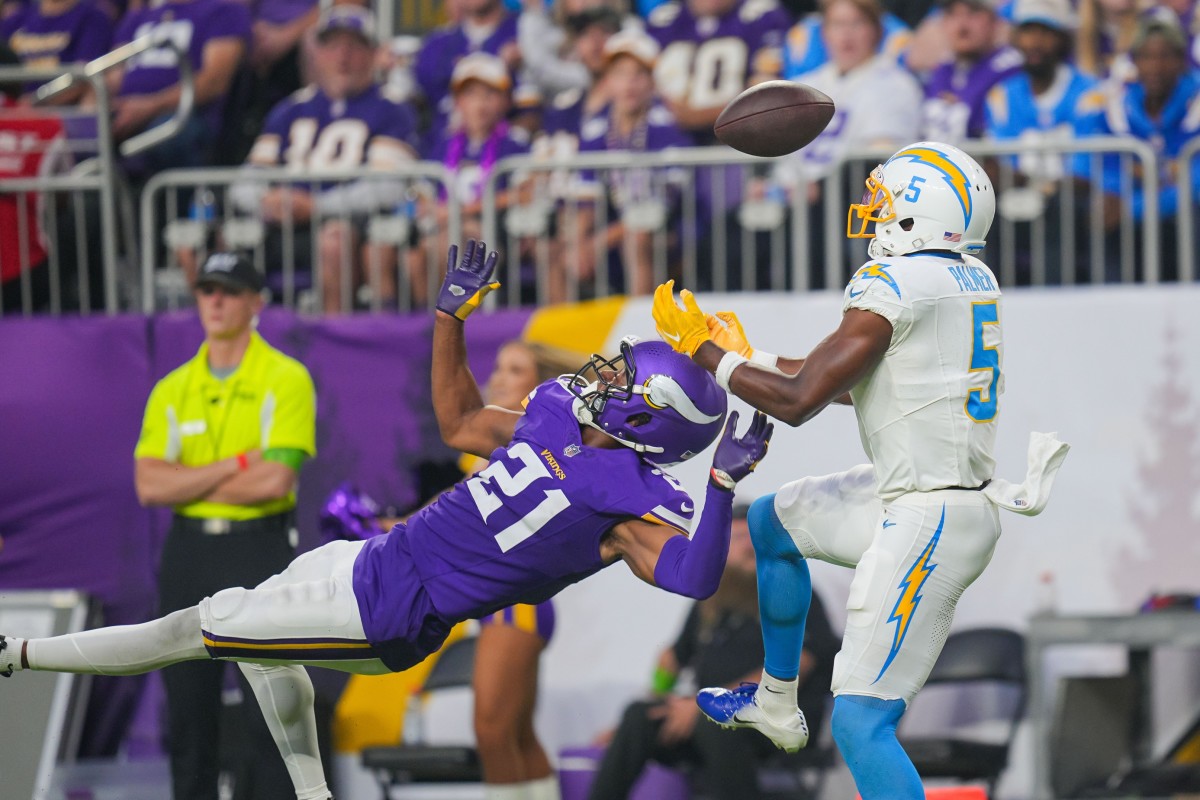5 things that stood out in the Vikings' gut-wrenching loss to Chargers

Another gut punch to the Vikings as they lost 28-24 to the Chargers on Sunday, dropping their record to 0-3 while the Lions and Packers both won to get to 2-1, two games ahead of Minnesota in the NFC North. There was plenty of bad and some good in the Vikings' latest loss so let's dive into it...
1. Good things happen when you throw to Justin Jefferson
Justin Jefferson's price keeps going up as Minnesota's playoff chances keep going down. The superstar wide receiver had 149 yards on seven receptions, including a 52-yard catch-and-run touchdown that put the Vikings up 24-21 in the fourth quarter.
The 24-year-old had 159 yards in Week 1, 150 yards in Week 2 and 149 yards in Week 3. He's on pace to finish the season with 2,595 yards. His receptions this week went for...
- 21 yards
- 34 yards
- 25 yards
- 6 yards
- 52 yards
- 3 yards
- 8 yards
Six of his seven receptions resulted in a first down or a touchdown. For the season, 20 of his 27 catches have been a first down or touchdown (19 first downs, 1 touchdown).
2. Brutal sequence midway through the 4th quarter

A killer two plays was L.A.'s 3rd-and-17 in the fourth quarter that Keenan Allen caught for a 20-yard gain. On the next play the Chargers scored when Akayleb Evans let an interception slide through his hands and into the hands of Josh Palmer for a 30-yard touchdown and a 28-24 lead.
woooooooooooow
— Los Angeles Chargers (@chargers) September 24, 2023
📺 | @nflonfox pic.twitter.com/aQZgYk9ynO
Explain being a Vikings fan with one play… #skol pic.twitter.com/20zX6egZxl
— 10,000 Takes (@10k_Takes) September 24, 2023
3. Jordan Addison came alive in crunch time
Addison had just one catch for four yards the first three quarters before coming alive with five catches and 48 yards in the fourth quarter. Three of his fourth quarter receptions resulted in first downs.
Through three games it is clear that Addison belongs in the NFL and was worth of a first-round pick. The rookie from USC had touchdown catches of 39 and 62 yards agains the Bucs and Eagles, respectively, and for the season is up to 13 catches for 185 yards and two scores.
4. Questionable decisions to run the ball late in the game
Minnesota was trailing 28-24 with under 4 minutes to play and they had the ball 2nd-and-goal inside the 1-yard line. Kevin O'Connell called a play that had Jefferson, Addison and Osborn off the field, clearly signaling the ball would be given to Alexander Mattison – and it was, and Mattison lost a yard.
Did the Vikings make a mistake by being so predictable? Was it wise to take Jefferson off the field with the game hanging in the balance? You be the judge...
"I was confident in that call," said O'Connell. "I have to go back and watch it and see where the breakdown was on the play."
There's no question the next decision to run the ball was ill timed. On 2nd-and-10 with 90 seconds to play, Cousins handed the ball to Mattison and he was stuffed for a 1-yard loss. That set up a 3rd-and-11 that the Vikings converted thanks to a penalty on the Chargers, but the running play in that situation seemed very unconventional.
5. Cousins, O'Connell lacked game management when it mattered
What was happening when the Vikings were rushing to the line of scrimmage in the waning seconds? Cousins hit Hockenson for a 9-yard gain and a first down to put Minnesota at the 6-yard line. Hockenson was tackled with about 37 seconds to go. Instead of running to the line to spike the ball and stop the clock, the Vikings meandered around, appearing confused, only to run the play that ended with a tipped ball and an interception to end the game.
A fitting way to lose that game for the Minnesota Vikings, another turnover #skol 0-3 pic.twitter.com/okvvBFfT8y
— Alex Micheletti (@AlexMicheletti) September 24, 2023
Why didn't Cousins spike the ball and have a first down with at least 20 seconds to play? O'Connell made it sound like Cousins was having a hard time hearing him in the headset.
"We have elements in our offense to go fast at the same rate of time, hopefully, that a clock play would be. There was a little bit of...with the crowd and the situation...with the headsets, there was a little bit of confusion early on by the time he was able to cleanly hear me and get everybody aligned, too much time had come off the clock," head coach Kevin O'Connell said. "Looking back on it, just should've clocked it and taken the three snaps from there to try and punch the ball in the end zone."
"I think he was having trouble hearing me at first," O'Connell continued. "Whether it was the crowd or what, he wasn't hearing me clean at first and then by the time he pieced it together, enough clock had gone off that I think probably we should've just clocked it at that point."
Why didn't Cousins just take command and clock the ball? O'Connell said that would've been an option if the headset communication had "completely" gone out, so it was the coach's call to make, apparently.
